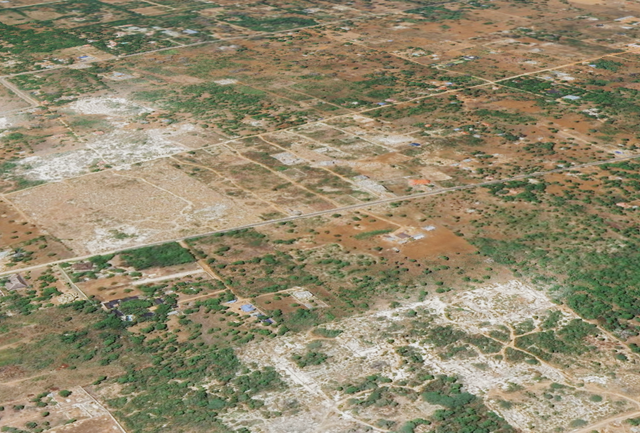Discovering Mavueni, a Place Poised for Renewal
Along Kenya’s beautiful but climate-challenged coast lies Mavueni, a vibrant neighborhood in Kilifi County. Known for its growing population, university campus, and bustling local markets, Mavueni is a community deeply connected to its land and water resources, and has developed into a hub for small-scale farmers.
Unfortunately, like many places across East Africa, it faces pressing challenges: unpredictable rainfall, declining soil fertility, and increasing demand for clean water. These shifts have led to frequent droughts, crop failures, and soil degradation, putting smallholder livelihoods at risk.
It’s clear to anyone: Mavueni is crying out for a sustainable solution, and fast. Our attention turned to Mavueni after extensive research highlighted its potential as a pilot site for innovative water and soil regeneration technologies. Local conversations revealed signs of stress in the landscape: patches of degraded soil, pressure on groundwater, and limited irrigation infrastructure. But we also saw resilience: a community eager to embrace sustainable solutions and restore their environment.
Consequently, this site appears to provide ideal preconditions for the Regen Desalination System, local / global impact and good returns for the partner/ investors. This study tells the story of Mavueni’s transformation potential—a story about turning environmental constraints into opportunities for growth, innovation, and lasting impact. It invites partners and investors to join us in nurturing a future where technology and nature work together for thriving communities along Kenya’s coast.
Project Overview:
- Location: 60,000 m² site in Mavueni, Kilifi County, South Africa
- Technology: Solar-powered seawater desalination coupled with an IoT-controlled drip irrigation system
- Goal: Produce fresh water sustainably for regenerative agriculture, afforestation, and ecosystem restoration
- Planting Strategy: Native and drought-tolerant species like bamboo, cashew, jatropha, mango, moringa, neem, papaya, sorghum, and sunflower to promote biodiversity and soil health
- Water Production Capacity: 650 desalination units producing ~91,000 liters per day

The Project Story: Innovation Meets Sustainability
This initiative combines renewable energy, smart irrigation, and modular water systems to create a fully autonomous, climate-resilient farming model. The technology and design focus on efficiency, sustainability, and scalability:
- Modular desalination units convert ocean water into fresh water on-site.
- An uphill water reservoir enables gravity-fed irrigation, cutting energy use.
- Brine storage manages desalination by-products safely to avoid environmental damage.
Technical Details at a Glance
- 650 modular units covering desalination, irrigation, greenhouse management, and IoT control.
- Solar-powered IoT system with sensors tracking soil moisture, salinity, and temperature in real time.
- Automated monitoring of water flow, desalination output, energy consumption, and reservoir levels.
- The entire system operates fully off-grid with minimal human intervention.
Water, Biodiversity & Soil Regeneration — Key Facts
Water & Biodiversity Highlights:
- Solar-powered desalination produces ocean water at under $0.004 per liter without tapping groundwater.
- Gravity-fed drip irrigation reduces water loss by minimizing evaporation and runoff.
- Reservoir ecology enhances local plant and animal life while improving water quality.
Soil Regeneration Insights:
- Degraded, low-organic soils are restored using nitrogen-fixing cover crops and organic biomass.
- No synthetic fertilizers; instead, root systems and mulch-producing plants build natural soil structure.
- Mulching plants also help prevent soil salinization and reduce moisture loss.
Economic Overview & Potential Returns
The project is designed with long-term profitability and resilience in mind, especially suited for challenging climates:
- Initial investment: under $500,000 USD with total spending over 10 years around $1.22 million USD.
- Land value increase: expected to triple (3x) in 10 years due to regeneration and improved productivity.
- Annual profits: conservatively estimated at $228,000 USD depending on focus areas like agriculture, material harvesting, or carbon credits.
- Water cost advantage: produces water at $0.00367 per liter, well below local market price ($0.0040 per liter).
- Funding opportunities: eligible for green grants, ESG funding, and climate innovation programs to offset costs and risks.
- Carbon credits: potential to cover operating costs if land value increases as projected.
Additional revenue streams include:
- Agricultural produce sales
- Processed materials such as salt from brine
- Social and ecological benefits that improve community resilience
- Access to further sustainability-focused funding and partnerships
The Bottom Line
This project turns environmental challenges into opportunities by integrating cutting-edge technology with nature-based solutions. It offers a resilient farming system that conserves water, restores soils, supports biodiversity, and generates real economic value. For investors and partners, the combination of low production costs, diverse income streams, and eligibility for sustainability funding makes it a compelling model for climate-smart agriculture.
CONFIDENTIAL: This study is commissioned and owned by ReGen Technology Holdings (Hong Kong) Limited. Please contact admin@regen.technology for more information.
Prepared by Andreas Theisinger & Dr. Jane Wong for ReGen Technology
Want to learn more?
Feel free to request the full feasibility study through our contact form…
